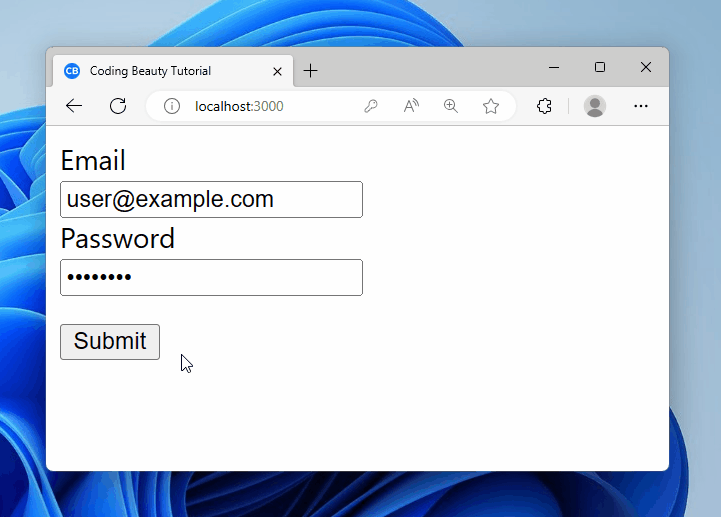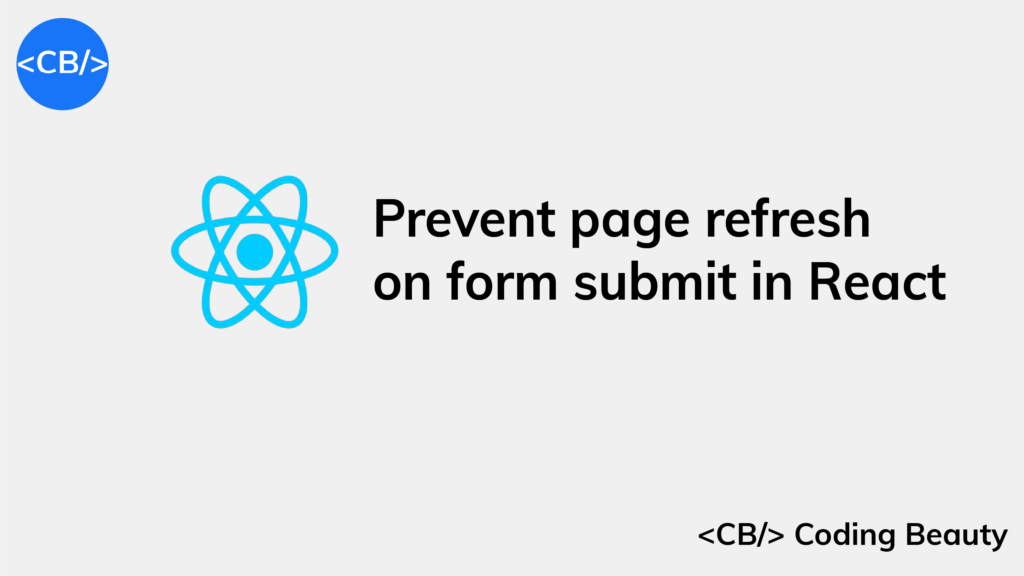To prevent a page refresh on form submit in React, call event.preventDefault() in the submit event listener.
import React, { useState } from 'react';
function LoginForm() {
const [email, setEmail] = useState('');
const [password, setPassword] = useState('');
const handleEmailChange = (event) => {
setEmail(event.target.value);
};
const handlePasswordChange = (event) => {
setPassword(event.target.value);
};
const handleSubmit = (event) => {
event.preventDefault();
// Simulate form submission by clearing input fields
setEmail('');
setPassword('');
};
return (
<form onSubmit={handleSubmit}>
<label>
Email
<br />
<input
type="email"
value={email}
onChange={handleEmailChange}
required
/>
</label>
<br />
<label>
Password
<br />
<input
type="password"
value={password}
onChange={handlePasswordChange}
required
/>
</label>
<br />
<button type="submit" style={{ marginTop: 16 }}>
Submit
</button>
</form>
);
}
export default function App() {
return <LoginForm />;
}
We use the Event preventDefault() method to stop the default action of the event from happening. In this case, that action was a page refresh, so preventDefault() prevented the page refresh on the form submission.
const handleSubmit = (event) => {
event.preventDefault();
// Simulate form submission by clearing input fields
setEmail('');
setPassword('');
};preventDefault() is a property of an Event object, which lets us access and modify event-related data.
We use the onSubmit prop to add a submit event listener to the form; this listener runs when the user clicks the button to submit the form.
All we did here was reset the form, but of course in the real world, you probably want to make an AJAX request to a server with the form data.
const handleSubmit = async (event) => {
event.preventDefault();
const user = {
email: email,
password: password,
};
try {
const response = await axios.post('http://your-api-url.com', user);
console.log(response.data);
} catch (error) {
console.error(error);
}
setEmail('');
setPassword('');
};For the button to submit the form, we must set its type prop to submit
<button type="submit" style={{ marginTop: 16 }}>
Submit
</button>With type="submit", the browser also submits the form when the user presses the Enter key in an input field.
Remove type="submit" from the button to prevent page refresh
To prevent page refresh on form submit in React, you can also remove the type="submit" from the button.
When is this useful? You may want to show an alert message or something before submission. In this case, we wouldn’t want type="submit" since it submits the form on button click.
import React, { useState } from 'react';
function LoginForm() {
const [email, setEmail] = useState('');
const [password, setPassword] = useState('');
const handleEmailChange = (event) => {
setEmail(event.target.value);
};
const handlePasswordChange = (event) => {
setPassword(event.target.value);
};
const handleSubmit = () => {
// Perform custom actions before form submission
alert('Are you sure you want to submit the form?');
// Simulate form submission by clearing input fields
setEmail('');
setPassword('');
};
return (
<form>
<label>
Email
<br />
<input
type="email"
value={email}
onChange={handleEmailChange}
required
/>
</label>
<br />
<label>
Password
<br />
<input
type="password"
value={password}
onChange={handlePasswordChange}
required
/>
</label>
<br />
<button type="button" onClick={handleSubmit} style={{ marginTop: 16 }}>
Submit
</button>
</form>
);
}
export default function App() {
return <LoginForm />;
}
We used type="button" on the button, but that’s as good as not having a type attribute. It doesn’t do anything on click.
Key takeaways
- To prevent page refresh on form submit in React, call
event.preventDefault()in thesubmitevent listener. - Set
type="submit"to ensure the form submits on button click or Enter press. Remove it when you don’t want this. - Remove
type="submit"when you need to do something after the button click before submitting the form, e.g., show a dialog, make an initial request, etc.
